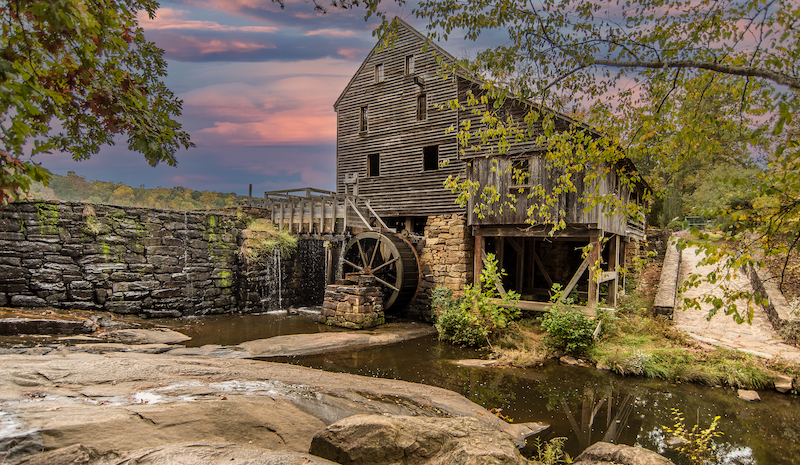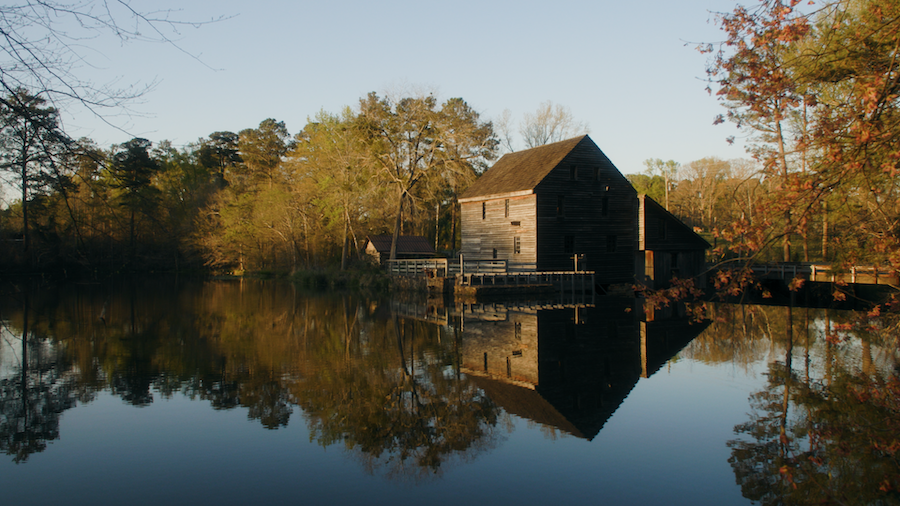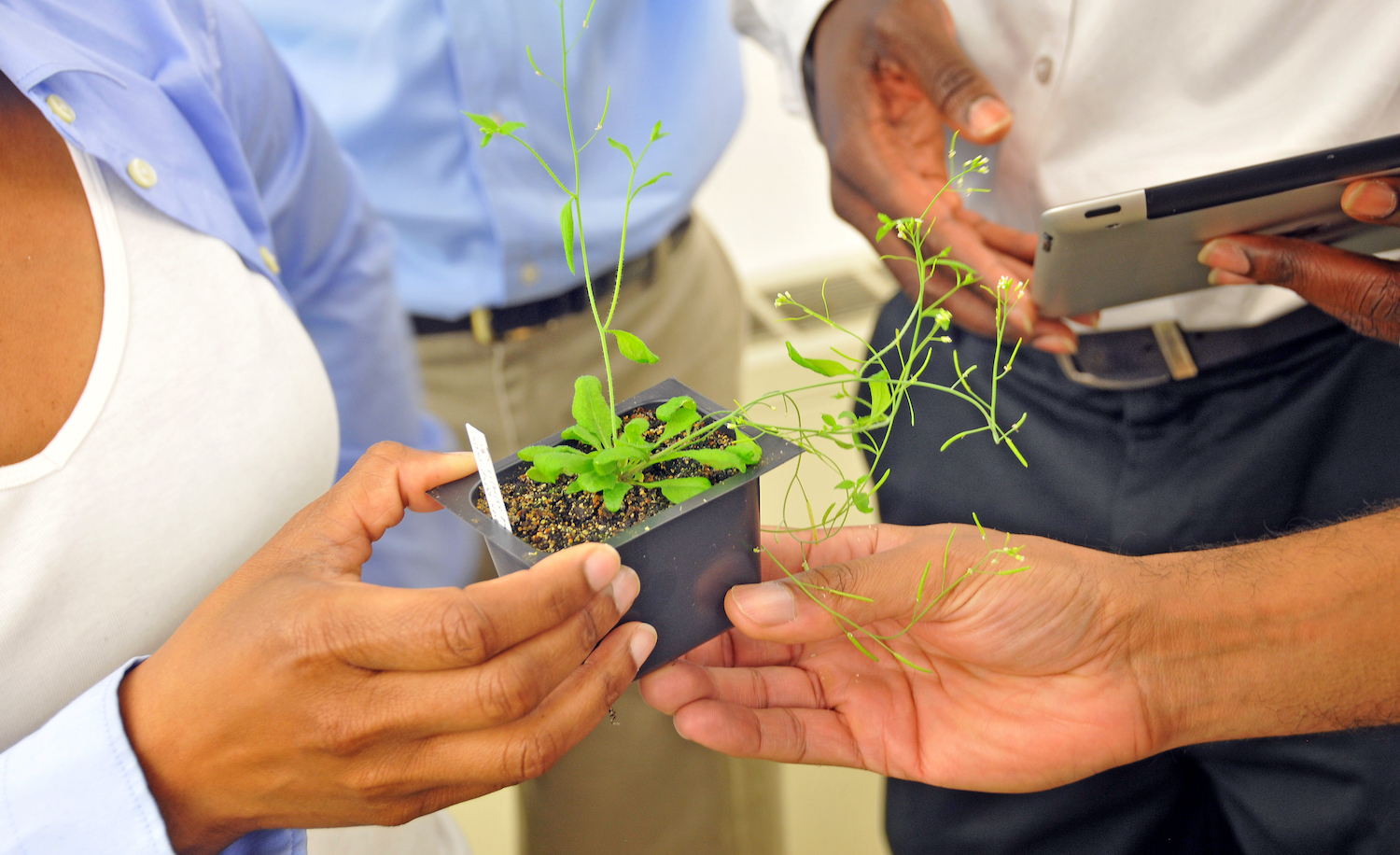Where City Meets Farm: The True Value of a Landmark Field Lab
In the midst of Raleigh’s urban sprawl, the Lake Wheeler Road Field Lab remains an active research farm for NC State and a critical resource for North Carolina’s largest industry.
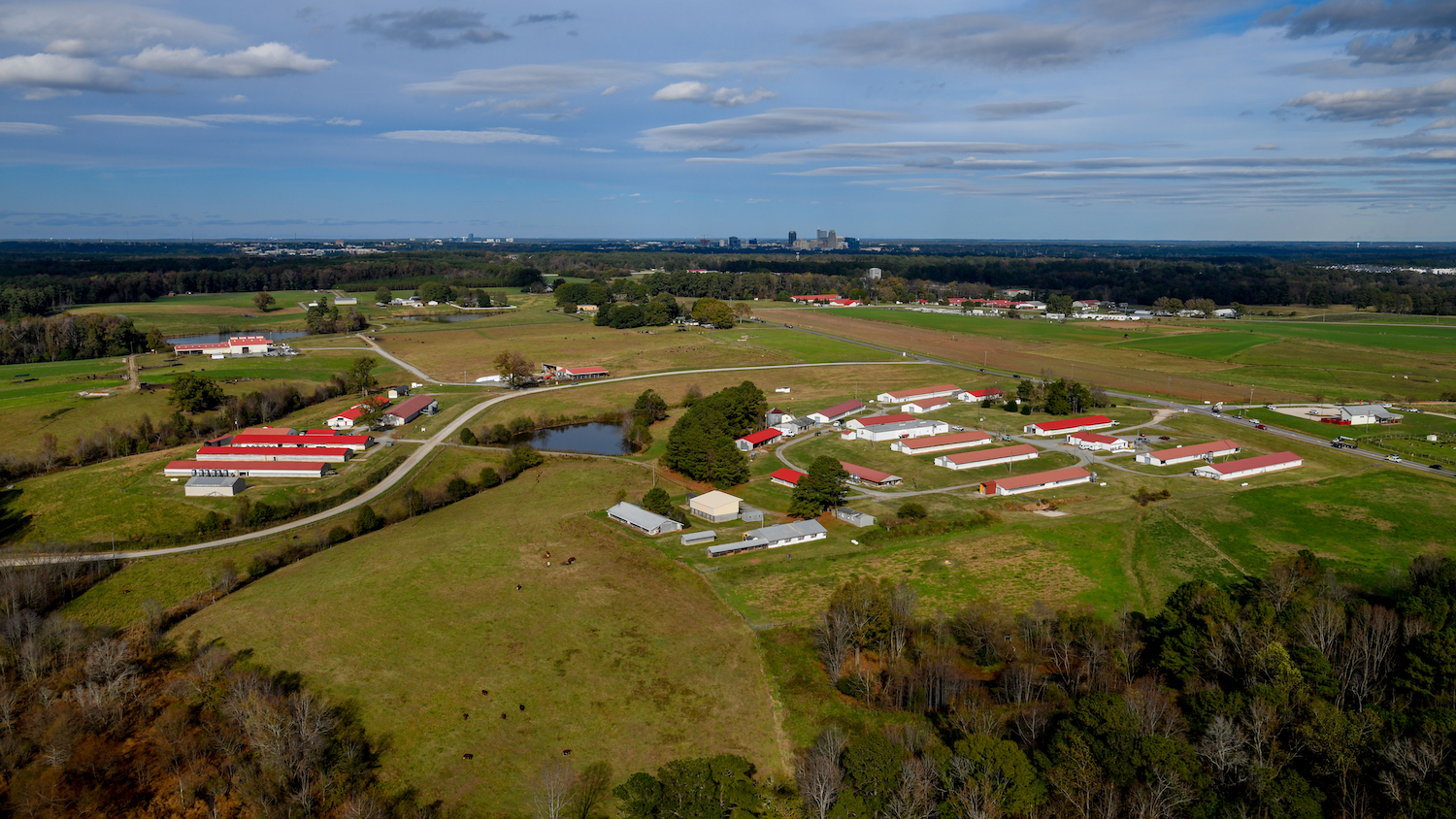
Just five miles from downtown Raleigh and the North Carolina State University campus sits the Lake Wheeler Road Field Laboratory, a productive and diverse teaching farm that drivers passing by could easily miss. This 1,784-acre swath of farmland is actually one of the largest remaining open spaces near the city.
As cranes dot the city’s skyline and orange cones line its roadways, dump trucks move root and earth to make way for more people. The Raleigh metro area grew 23% from 2010 to 2019, and the state as a whole had the third-highest in-migration in the United States in 2021.
According to data provided by Georgina Sanchez at the NC State Center for Geospatial Analytics, developed land in North Carolina has increased by 24% over the past two decades while agricultural land has decreased by 6%. In Wake County, the changes are much more drastic: 16% of Wake County’s agricultural land has been lost since 2001 with an additional 21% projected to be lost by 2050. Indeed, N.C. Agriculture Commissioner Steve Troxler has highlighted the loss of farmland as one of the state’s biggest issues.
NC State and the North Carolina Department of Agriculture and Consumer Services own and operate thousands of acres across the state at 24 research stations, field labs and extension centers that act as conduits between university research and North Carolina’s agricultural community.
The Lake Wheeler Road Field Lab is vital to NC State’s land-grant mission of teaching, research and extension. As developers look to acquire any available open land, protecting the Lake Wheeler farmland remains a top priority for NC State and the College of Agriculture and Life Sciences.
“Because of its proximity to Raleigh, I get inquiries from people every month about this land,” says Steve Lommel, director of the North Carolina Agricultural Research Service. “I used to only get a few every year, so it has definitely increased lately. But the bottom line is that Lake Wheeler is not for sale. This land is absolutely essential.”
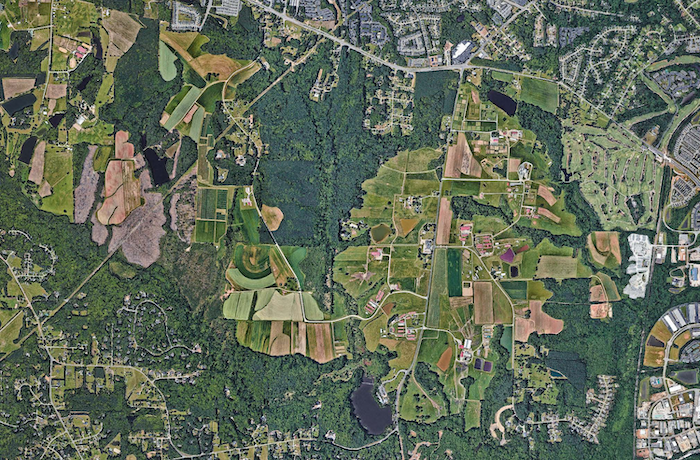
Lake Wheeler is one of the most diverse university farms in the country, according to Bridget Lassiter, the field lab’s superintendent. With over 20 research units, the farm’s diversity mirrors North Carolina’s multibillion-dollar agriculture industry. It also sets NC State apart; few land-grant universities have a farm so close to an urban campus.
The field lab acts as an outdoor classroom, integrating plant and animal science with engineering, sustainability and resource economics. The animal science department alone teaches over 1,700 students there every semester.
The field lab doesn’t just educate students. From the Sediment and Erosion Control Research Education Facility to the Pest Control Training Pavilion to countless training sessions on wastewater management, Lake Wheeler trains over 4,000 professionals every year. These professionals are essential for keeping North Carolinians and the environment safe and healthy.
Any open land that people might mistake for empty fields ripe for development is already taken up by hay, silage, grazing space and waste management areas for the field lab’s animals.
“It might look like empty fields to some people, but there is absolutely zero unused land at Lake Wheeler,” says Loren Fisher, director of research stations and field labs at NC State.
Lommel explains that if houses or office buildings were allowed to be developed on the farm, the site would be rendered non-compliant. As a result, for example, animal herds would need to be reduced or eliminated completely, diminishing NC State’s ability to provide animal research and teaching facilities for its students and faculty.
“The fact is, we do teach thousands of students and professionals here. We need that land for proper permitting of our facilities, and we need these facilities to train the next generation of farmers and ag students,” says Lommel. “We also do very important research here.”
With a finite amount of land available for field research so close to campus, researchers at the field lab are innovating ways to think and do more with what they have. A $1.2 million fiber internet building expected to be completed in May will truly bring the field lab into the future by spurring smarter agriculture through advanced data collection and analysis.
On top of the teaching and research mission, the field lab is becoming an agritourism destination. Over 10,000 people from across the state attend the Farm Animal Days event every year. The Howling Cow Dairy Education Center and Creamery, the first retail store on a university farm in the country, welcomes over 3,000 visitors monthly. Howling Cow ice cream is made and sold by NC State students, while the cows are milked and cared for by animal science students who live right on the farm.
So it’s not just the physical 1,784 acres that provide North Carolina and NC State with so much value. As Lommel notes, thousands of students—the future farmers, industry leaders and climate specialists—benefit from this land by gaining the necessary skills to address our most pressing challenges. Lake Wheeler’s true value rests in the future of the food system, our ability to solve problems and generations of changemakers.
Units at Lake Wheeler Road Field Lab
Agroecology Education Farm
Produce raised at the Agroecology Education Farm is served up in NC State Dining Halls, and the waste is composted and used to enrich the farm’s soil. The farm’s mission is to promote agroecology and sustainable food systems by providing NC State students and the broader community with diverse opportunities for experiential learning.
Air Quality-Plant Growth and Development Unit (U.S. Department of Agriculture Agricultural Research Service)
This unit has conducted research for many years on air pollution and climate change to determine impacts of elevated ozone, carbon dioxide and temperature on agricultural crops and natural vegetation. In all crops examined to date, genetic variation in ozone sensitivity has been observed. Yield loss can be reduced by use of tolerant varieties. USDA scientists screen snap bean, soybean, and wheat cultivars for differences in ozone response to identify tolerant lines and to understand the genetics of tolerance.
Animal Air Quality and Environmental Management Field Laboratory
With the mission of fostering the growth of research, extension, and education programs in air quality and animal production housing environmental control and waste management, the Animal Air Quality and Environmental Management Field Laboratory advances scientific excellence and understanding of urgent issues in animal production environmental control, air emission and animal welfare; promotes collaboration among researchers and scientists from industries, governmental agencies and academia; and provides educational opportunities that allow students to gain fundamental knowledge for developing related careers.
Animal and Poultry Teaching Unit
North Carolina is among the nation’s leading producers of poultry and eggs, and NC State University’s Animal and Poultry Teaching Unit is part of a comprehensive research, academic and extension program aimed at ensuring a strong, sustainable industry. The site includes facilities that allow educators to blend classroom instruction with hands-on learning for both students and industry professionals, and it maintains purebred flocks of Jungle Fowl, Rhode Island Red and Barred Plymouth Rock chickens used for on-site education as well as for school-enrichment programs related to embryology.
Animal and Poultry Waste Management Center and Processing Facility
About two-thirds of North Carolina’s agricultural income comes from the livestock, dairy and poultry industries, and NC State’s Animal and Poultry Waste Management Center and Waste Processing Facility provide the infrastructure and equipment for faculty and center members to explore ways to convert waste from these industries into value-added products, such as bioenergy and soil amendments. The goal is to make the industry more profitable and environmentally sustainable.
Animal Health Building
The Animal Health Building is home to NC State’s Laboratory of Developmental Nutrition, which conducts research to improve the health and vitality of young piglets. It contains specialized facilities to study early-life nutrition and its impact on growth, development and intestinal health. The research findings apply not only to agriculture but also to human health because piglets are an excellent model for pediatric nutrition.
Aquaculture Education Unit
Along with the Pamlico Aquaculture Field Laboratory in Aurora, North Carolina, the Aquaculture Education Unit supports NC State University researchers who are working with industry to increase statewide production of hybrid striped bass. For over 30 years, scientists have studied ways to improve hybrid striped bass growth rates, stress tolerance and disease resistance and to optimize feed efficiency. The team believes these advantages, in addition to its ability to spawn the fish naturally and without hormones, have primed striped bass for commercial success.
Bee Research Facility
About one-third of everything we eat—and most of the healthy fruits, vegetables, and nut crops—heavily rely on pollination for seed and fruit set, and honey bees are the primary insect pollinator used across the state and nation. The NC State Apiculture program’s Bee Research Facility is used for research and extension education on maintaining healthy colonies, improving breeding strategies for improving genetic stock, and protecting honey bees from various stressors to promote sustainable beekeeping.
Chicken Education Unit
The 18-acre Chicken Education Unit addresses challenges and opportunities stemming from the increasing consumption of poultry. The unit’s research addresses antibiotic-free production, intestinal health, muscle myopathies and more. By employing student workers, the unit provides hands-on experience that helps prepare them for careers as scientists and poultry production professionals.
Compost Facility and Research Cooperative
The 3-acre Compost Facility and Research Cooperative at NC State closes the loop with organic waste collected from across campus (including the dining halls), processing it into nutrient-rich compost used in the campus landscape and at the Agroecology Education Farm. The facility offers learning opportunities for classes, and partnerships for researchers on campus and in the private industry.
Compost Learning Lab
An education, research and hands-on demonstration site, NC State University’s Compost Learning Lab has 25 types of backyard composting and vermicomposting units, both medium and small scale.
Dairy Education Unit
To get a glimpse—and a taste—of North Carolina’s dairy industry and of the NC State University Dairy Education Unit’s role in ensuring the industry’s sustainable future, members of the public are invited to visit the Howling Cow Creamery at the Lake Wheeler Road Field Lab. There, they can choose from 17 flavors of ice cream produced on campus and take in views of all seven of the state’s major dairy breeds as they graze outside. For those who want to know more, the nearby Randleigh Dairy Heritage Museum offers a unique agritourism experience for children and adults to learn how milk gets from the farm to the table.
E. Carroll Joyner Beef Education Unit
Hosting numerous events throughout the year, the E. Carroll Joyner Beef Education Unit is an important asset for NC State University students and for the North Carolina beef industry. 4-H’ers come to the unit to compete in livestock contests, and an animal sales merchandising class gets hands-on marketing experience by conducting an annual livestock auction. The biggest event of all is Farm Animal Days, which brings thousands of people interested in seeing and touching farm animals. They also learn about agriculture. Geared mainly for school field trips for children in preschool through first grade, the event welcomes families and individuals for 3 days in April each year.
Feed Mill Education Unit
In addition to serving as a resource for teaching students and feed industry professionals, NC State University’s Feed Mill Education Unit manufactures precision research diets used by faculty members and graduate students and by allied industries on a fee or contract basis. The mill also hosts studies on feed quality and feed milling efficiency.
Fike Crop Teaching Garden
The 4-acre Fike Crop Teaching Garden serves as an outdoor classroom that allows two-year and four-year students to gain practical experience in crop management and food, fiber and specialty crop production. Students receive hands-on learning by examining crop responses to varying environmental conditions and diverse cropping practices. Its new site, adjoining the Agroecology Farm, provides for a unique integration of diverse farming systems that allow for well-rounded learning experiences and opportunities for community engagement. The teaching area is available for classes in topics ranging from entomology to soil science, and student organizations and clubs use the site for meetings and activities.
JC Raulston Arboretum Research Farm
The JC Raulston Arboretum Horticulture Research Farm is a new addition to the Lake Wheeler Road Field Lab. NC State University plant breeders use this converted hay field to test new ornamental crops, including trees and bushes, for adaptation to North Carolina’s piedmont growing region.
J. Edward Booth Field Learning Lab
The J. Edward Booth Field Learning Lab anchors NC State’s hands-on certification and recertification program for sediment and erosion control, waste management and pest control. Since 2016, the program has held over 360 classes and trained over 21,000 individuals. About 50% of all North Carolinians use septic systems, making training for on-site wastewater installers and maintenance personnel critical.
Sediment and Erosion Control Research and Education Facility
NC State University’s Sediment and Erosion Control Research and Education Facility hosts research into new and improved methods to prevent pollution from stormwater runoff. These practices are in turn demonstrated there during field days, workshops and other training and educational events for national, state and local stormwater control professionals.
Small Grains Research Area (USDA ARS)
At the Lake Wheeler Road Field Lab’s Small Grains Research, plant scientists with the U.S. Department of Agriculture’s Agricultural Research Service develop superior wheat cultivars. They’ve also worked hard to come up with cultivars that North Carolina farmers can grow for bakers helping fill consumer demand for products made from locally grown grains.
Structural Pest Training Facility
The Structural Pest Management Training and Research Facility is a partnership of NC State University with the North Carolina Pest Management Association and the state Department of Agriculture and Consumer Services. Training programs help pest management professionals and others stay up to date on topics including management of termites, ants, cockroaches and other insect pests. The facility is part of the J. Edward Booth Field Learning Laboratory.
Swine Education Unit
The mission of NC State University’s Swine Educational Unit is to provide basic and advanced training for students with regards to the modern care and management of pigs; conduct research designed to improve production efficiency that also enhances animal well-being and reduces environmental impacts; and provide educational opportunities for both industry professionals and the public. Because of their high health status, pigs raised at the unit often are purchased by medical schools and government agencies and used in their research programs that study human ailments. Research conducted at the unit has resulted in many of the modern techniques used around the world to breed pigs as well as the development of many human infant formulas available in the United States today.
Talley Turkey Education Unit
NC State University’s Talley Turkey Education Unit, endowed by the Windell and Judy Talley family, has the honor of being the permanent home of the Presidential Pardoned Thanksgiving Turkeys Chocolate and Chip, which were provided in 2022 by Circle S Ranch and the National Turkey Federation. The Prestage Department of Poultry Science faculty and staff working on this unit provide quality teaching, research and extension opportunities for students, interns, scholars and turkey producers across North Carolina, the nation and the world. These opportunities include hands-on course laboratories and research and outreach studies on turkey management, nutrition, genetics, health, behavior, welfare and meat sciences. Students also have opportunities for part-time employment to further their experiences in turkey production and science.
Turfgrass Field Laboratory
The Turfgrass Field Lab at NC State University is home to research and educational programs aimed at strengthening North Carolina’s turfgrass industry while protecting the natural resources on which that industry depends. Some 750 people gather at the 24-acre Lake Wheeler Road Turfgrass Field Lab each August for the nation’s largest field day dedicated to turfgrass science.
Weed Science Teaching Field Lab
At the Weed Science Teaching Field Lab and Training Center, students, county Extension agents, and other stakeholders learn about weed identification, herbicide symptomology and the diagnosis of common maladies affecting North Carolina crops. Controlling weeds is one of the largest expenses in crop protection, and when they are not properly controlled, weeds cause significant losses. Therefore, what students and others learn at this site can enable them to significantly reduce production losses.
- Categories:
